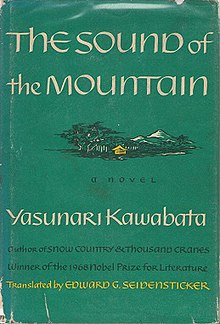| Revision as of 19:57, 19 November 2014 editAndrewOne (talk | contribs)Extended confirmed users, Rollbackers11,492 editsNo edit summary← Previous edit | Revision as of 23:28, 29 December 2015 edit undoGrahamHardy (talk | contribs)Autopatrolled, Extended confirmed users, Pending changes reviewers473,753 edits +cover image & publisherNext edit → | ||
| Line 9: | Line 9: | ||
| | translator = ] | | translator = ] | ||
| | author = ] | | author = ] | ||
| | image = File:TheSoundOfTheMountain.jpg | |||
| | caption = First English-language edition | |||
| | country = Japan | | country = Japan | ||
| | language = ] | | language = ] | ||
| | genre = |
| genre = | ||
| | publisher = | | publisher = | ||
| | pub_date = 1949–1954 | | pub_date = 1949–1954 | ||
| | english_pub_date = 1970 (]) | |||
| | english pub_date = 1970 | |||
| | media type = Print (]) | | media type = Print (]) | ||
| }} | }} | ||
Revision as of 23:28, 29 December 2015
This article has multiple issues. Please help improve it or discuss these issues on the talk page. (Learn how and when to remove these messages)
|
 First English-language edition First English-language edition | |
| Author | Yasunari Kawabata |
|---|---|
| Original title | 山の音 Yama no Oto |
| Translator | Edward Seidensticker |
| Language | Japanese |
| Publication date | 1949–1954 |
| Publication place | Japan |
| Published in English | 1970 (Knopf) |
The Sound of the Mountain (Yama no Oto) is a novel by Japanese writer Yasunari Kawabata, serialized between 1949 and 1954. The Sound of the Mountain is unusually long for a Kawabata novel, running to 276 pages in its English translation. Like much of his work, it is written in short, spare prose akin to poetry, which its English-language translator Edward Seidensticker likened to a haiku in the introduction to his translation of Kawabata's best-known novel, Snow Country.
Sound of the Mountain was adapted as a film of the same name (Toho, 1954), directed by Mikio Naruse and starring Setsuko Hara, So Yamamura, Ken Uehara and Yatsuko Tanami.
The book is included in the Bokklubben World Library's list of the 100 greatest works of world literature.
For the first U.S. edition (1970), Seidensticker won the National Book Award in category Translation.
Plot
The novel centers upon the Ogata family of Kamakura, and its events are witnessed from the perspective of its aging patriarch, Shingo, a businessman close to retirement who works in Tokyo. Although only sixty-two years old at the beginning of the novel, Shingo has already begun to experience temporary lapses of memory, to recall strange and disturbing dreams upon waking, and occasionally to hear sounds heard by no one else, including the titular noise which awakens him from his sleep one night, "like wind, far away, but with a depth like a rumbling of the earth." Shingo takes the sound to be an omen of his impending death, as he had once coughed up blood (a possible sign of tuberculosis) a year before, but had not sought medical consultation and the symptom subsequently went away.
Although he does not outwardly change his daily routine, Shingo begins to observe and question more closely his relations with the other members of his family, who include his wife Yasuko, his philandering son Shuichi (who, in traditional Japanese custom, lives with his wife in his parents' house), his daughter-in-law Kikuko, and his married daughter Fusako, who has left her husband and returned to her family home with her two young daughters. Shingo realizes that he has not truly been an involved and loving husband and father, and perceives the marital difficulties of his adult children to be the fruit of his poor parenting.
To this end, he begins to question his secretary, Tanizaki Eiko, about his son's affair, as she knows Shuichi socially and is friends with his mistress, and he quietly puts pressure upon Shuichi to quit his infidelity. At the same time, he uncomfortably becomes aware that he has begun to experience a fatherly yet erotic attachment to Kikuko, whose quiet suffering in the face of her husband's unfaithfulness, physical attractiveness, and filial devotion contrast strongly with the bitter resentment and homeliness of his own daughter, Fusako. Complicating matters in his own marriage is the infatuation that as a young man he once possessed for Yasuko's older sister, more beautiful than Yasuko herself, who died as a young woman but who has again begun to appear in his dreams, along with images of other dead friends and associates.
The novel may be interpreted as a meditation upon aging and its attendant decline, and the coming to terms with one's mortality that is its hallmark. Even as Shingo regrets not being present for his family and blames himself for his children's failing marriages, the natural world, represented by the mountain itself, the cherry tree in the yard of his house, the flights of birds and insects in the early summer evening, or two pine trees he sees from the window of his commuter train each day, comes alive for him in a whole new way, provoking meditations on life, love, and companionship.
References
-
"National Book Awards – 1971". National Book Foundation. Retrieved 2012-03-11.
There was a "Translation" award from 1967 to 1983.
| Works by Yasunari Kawabata | |
|---|---|
| Novels |
|
| Short stories |
|
| Adaptations |
|